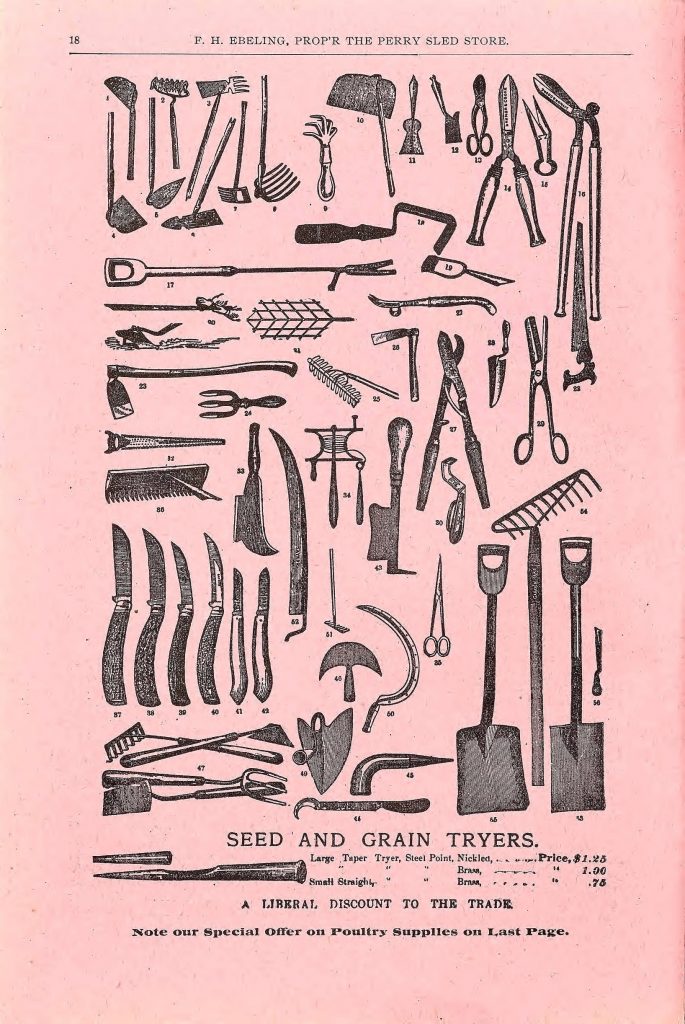Brian S. Ellis
From Uline to Zero
- Uline Shipping Supply Specialists Catalog
- The Salyut 6 Cyclogram
- Surfaces and Essences: Analogy as the Fuel and Fire of Thinking by Douglas Hofstadter and Emmanuel Sander
- The Dancing Plague of 1518
- Robert of Geneva, Antipope Clement VII
- 1440-1450 CE
- Stewart Walker: Granular Synthesis/The Bay Between the Bridges
- Coffee
- Green
- Zero

Uline Shipping Supply Specialists Catalog
This catalog comes to my house 4 times a year for a company called Panacea Botanicals. I obsess over it for a couple weeks afterwards. The pages with the different types of cardboard boxes are pretty dull, but the catalog starts getting juicy in the middle. First with zip-ties and later the section with pallet-jacks. Like full size pallet jacks. They’ve got peg-board, shrink-wrap, clothing stands, heat guns, everything. I reminds me of all the jobs I’ve ever had combined. Like when you die everyone you love is dancing on a beach. Having the right tool for the right moment.
The Salyut 6 Cyclogram
Created by Cosmonaughts Georgi Grechko and Yuri Romanenko to mark off their Salyut 6 spaceflight. They orbited the earth for 96 days between December 10 1977 and March 16 1978. The long accordion map of it is crossed horizontally by wavy bands of yellow and blue that demarcates time in the shadow of the earth and time in the sunlight. They orbited the earth every 91 minutes. The minutes it took to orbit the earth make up the y-axis of the map. The passing of the 24 hour period of the days are marked horizontally along the x-axis. This is a map with Time on each axis. In the course of the mission Georgi and Yuri experienced 3,000 sunrises.
Surfaces and Essences: Analogy as the Fuel and Fire of Thinking by Douglas Hofstadter and Emmanuel Sander
The thesis, which is basically contained in the title, is something I was already convinced of, at least on a sub-conscious level. So the revelation for me was that there were a lot of people out there who don’t think that the mind is a net of context hanging precariously over nothing that this book is out to convince. It’s really well written at any rate, even though sometimes it reads like a drunk friend having a epiphany and giving you that whole, “But think about this!” treatment.
The Dancing Plague of 1518
In July 1518 in the city of Strasbourg France a serious outbreak of manic dancing afflicted residents of the city, who would dance non-stop for four to six days, and often die of exhaustion. Within one month 400 people caught the plague. Local physicians determined the cause of the plague to be ‘hot blood.’ City leaders erected a dancehall and prescribed pre-emptive dancing to keep people’s blood from getting too hot.
Robert of Geneva, Antipope Clement VII
From 1309 to 1377 the papal seat was moved from Rome to Avignon. Seven successive Popes resided in the city until Pope Gregory XI returned to Rome. Gregory’s death leads to the Western Schism, when both Avignon and Rome laid claim to the papacy. Urban VI took seat in Rome and Clement VII in Avignon, becoming the antipope. The term Antipope has been used by historians to label figures who opposed the papacy, but Clement VII wasn’t opposing anything: he was the pope. Antipope isn’t the clever name of a metal band, or the High Priest of the Satanists. Sometimes there is no difference between a thing and it’s opposite.
1440-1450 CE
These are the years in which, at some point, the moveable type printing press was invented. There are some theories, but no one is sure of the year. That’s a full decade. Think of all the things that have happen to you in the last ten years. Think of how much the world changed between 2000 and 2010. Or 1990 and 2000. Any decade. Think how this must feel for the internet. It’s like not knowing how old your Dad is.
Stewart Walker: Granular Synthesis/The Bay Between the Bridges
Released in Germany in 2000. This is a recording made in Athens, Georgia from 1995. It’s a minimal composition utilizing and Oberheim OB-8, Roland Juno-60, Roland D-50 and a Sovtek Small Stone phaser. This is the closest music has ever sounded like thinking.
Coffee
Steam of the great machine. Locomotive oil to make a map. Rich and shouting. Up the edifice. Sacrifice of heat. Steel, copper and lime. Both centuries. The machine could change the questions. The skull and its million names, all at once. The way my name sounds on a typewriter. My feelings about the ocean. My memories of remembering.
Green
Where did all the tall. What shaved blood. This kind of wind. Paintings, balloons, turning. The night of summer. Early stories. Tell Edison. The frames of houses. The taste of the sand before light. When the light never leaves. All the possible travel. The era of coins. Some cheap beer. I’ve never learned to skateboard. The idea for a song. It’s absurd I cannot fly.
Zero
Don’t change. Darling, darling, darling. Don’t answer my questions. Don’t become the hunger. Stay longer. The clock won’t move. I don’t understand nudity. The entire sun is over. Woe, secret weapon. Trade for the hands. Come with me everywhere. Answer like a phone. My name, my name. Add you to everything. Never take you away.
Brian S. Ellis
Brian S. Ellis is the author of four collections of poetry, the most recent of which is Often Go Awry from University of Hell Press. He lives in Portland, Ore.